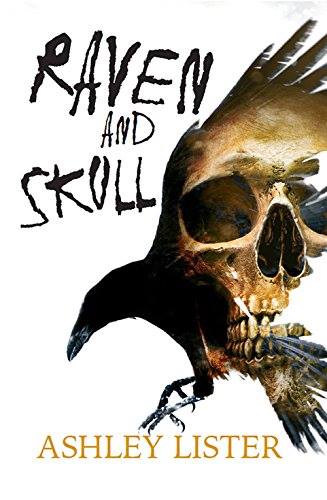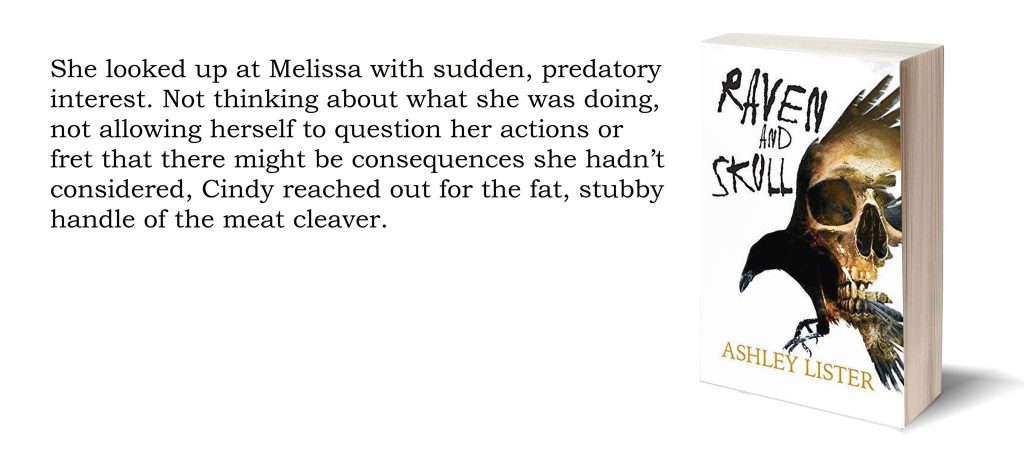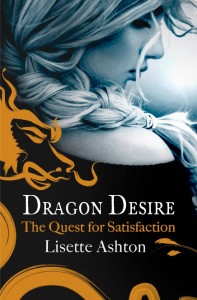It’s always a pleasure to have the fabulously versatile Ashley Lister as my guest. Sometimes it’s poetry, sometimes it’s erotica and today it’s something totally different. Today it’s horror. Welcome, Ashley!
 Raven and Skull
Raven and Skull
By Ashley Lister
Have you ever worked in an office? Good. Then you’ll know what I’m talking about here.
I first started working in an office many years ago when I was back in my twenties. Back then computers were a novelty and fax machines were state of the art technology. Most desks had ashtrays and every telephone was a landline.
A few cynics asked me if I ‘liked’ office work. They used that sneering tone of voice that suggested I would clearly be a few sandwiches short of a picnic basket if I did like such tedium. I always answered, “Well, I’m indoors, getting paid, and I can keep my clothes on, so it’s an improvement over my last job.”
Maddeningly, most people missed the attempt at humour in this response.
But it was office work and, as happens with office work, I got to the stage where I could do the complex administrative stuff without giving it a second thought. Almost as though I was a zombie. Or an automaton. Or some soulless abominable hybrid of human and machine.
I think it was either Alan Carr or Jimmy Carr who said they’d worked in an office where a woman sat behind a desk with a sign that said, “You don’t have to be mad to work here, but it helps.” Carr explained that this particular sign was more impressive than most because the woman had written it in her own faeces.
And, whilst I’ve always found this joke to be amusing, I think it touches on a real truth.
Office work can drive us crazy. Office work, where the trivial and unimportant becomes obscenely vital to the point of psychosis, can drive us round the bend. It has made me scowl at the sound of a colleague’s laughter. It has made me hide from someone who wanted nothing more than to talk to me. In truth, office work has made me act in ways that can properly be described as horrific.
Which is why I wrote a horror novel based in an office. From personal experience I believe it’s hard to think of a more horrific environment. These are the opening lines from my latest novel, Raven and Skull.
Raven and Skull Excerpt:
‘Tell us about a time you nearly died, Tony.’
Heather’s suggestion was greeted by a barrage of laughter.
There were half a dozen of them sitting around the table – the last souls left in an otherwise empty bar. Drained beer bottles and lipstick-smudged glasses stood between them like abstract monuments to the memories of good times gone. The darkness outside the bar window was fading to the apocalyptic grey of another dawn.
Tony glanced at his five colleagues and flashed an automatic grin. He hadn’t yet drunk enough beer to be light-headed, but he could feel the mood around the table was shifting. The evening had started as an early weekend escape from the offices of Raven and Skull; a two fingered salute to the workplace in the time-honoured tradition of every godforsaken Friday. After a grim week working nine-to-five – a grimmer week than any of them were used to suffering – Geoff’s idea that they should get pissed and have a laugh together had seemed like a stroke of pure genius. But now, whilst the maudlin veil of melancholy felt like it was finally lifting, Tony thought it was revealing something strange, unpleasant and potentially dangerous.

Of course, the employees in this novel only have to contend with the diabolical, the supernatural, and their own dark and twisted desires. As office workers, I’m sure we all know the experience can be far more sinister. If you want to find out more about this story, please check out my blog: http://ashleylisterauthor.blogspot.co.uk/
Or if you want to buy a copy, it’s available from most good bookstores, as well as the usual online retailers: https://www.amazon.co.uk/Raven-Skull-Ashley-Lister/dp/1910720534/ or https://www.amazon.com/Raven-Skull-Ashley-Lister/dp/1910720534/
 First I have to thank the lovely KD Grace for inviting me here today. KD Grace is one of my favourite authors and I’m genuinely honoured to be a guest on her blog.
First I have to thank the lovely KD Grace for inviting me here today. KD Grace is one of my favourite authors and I’m genuinely honoured to be a guest on her blog.